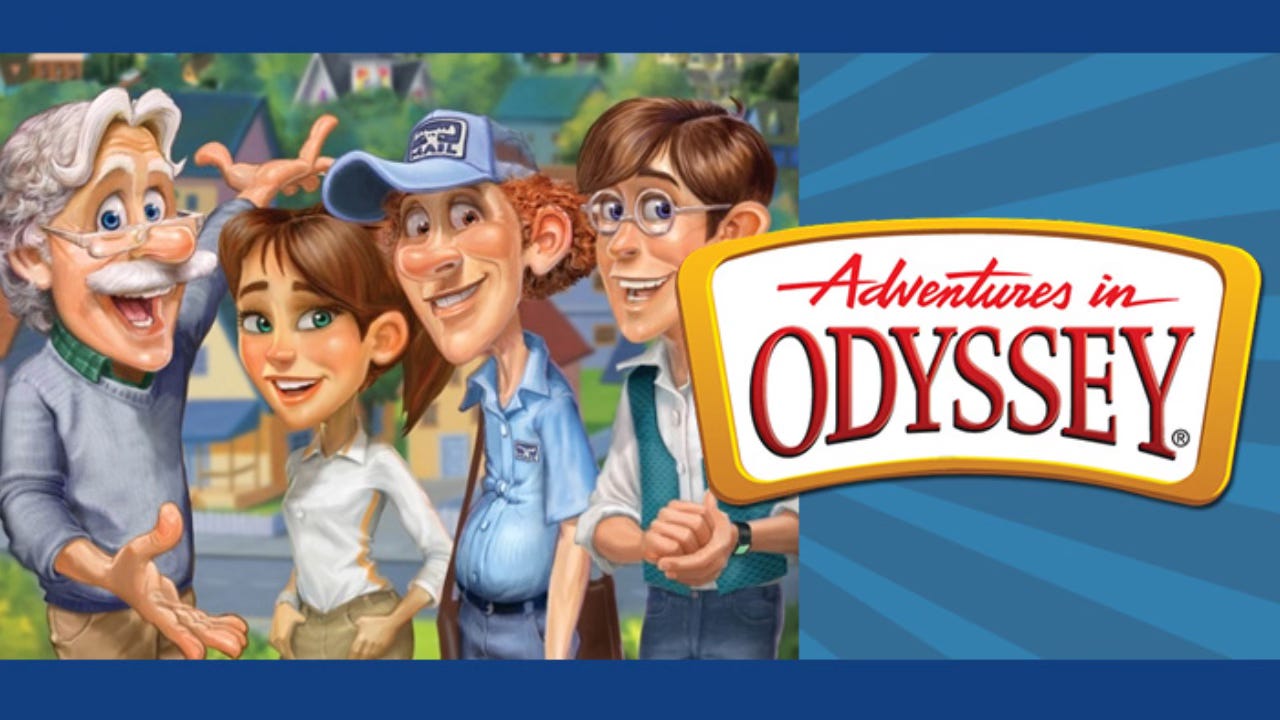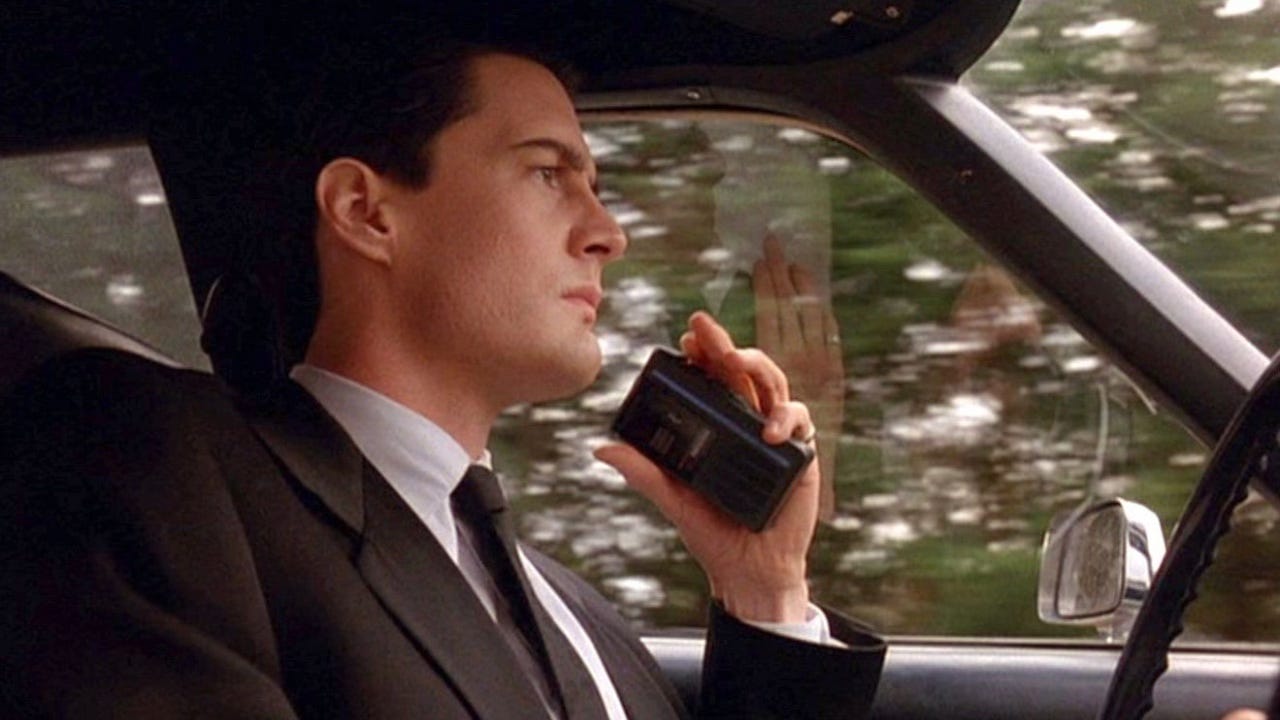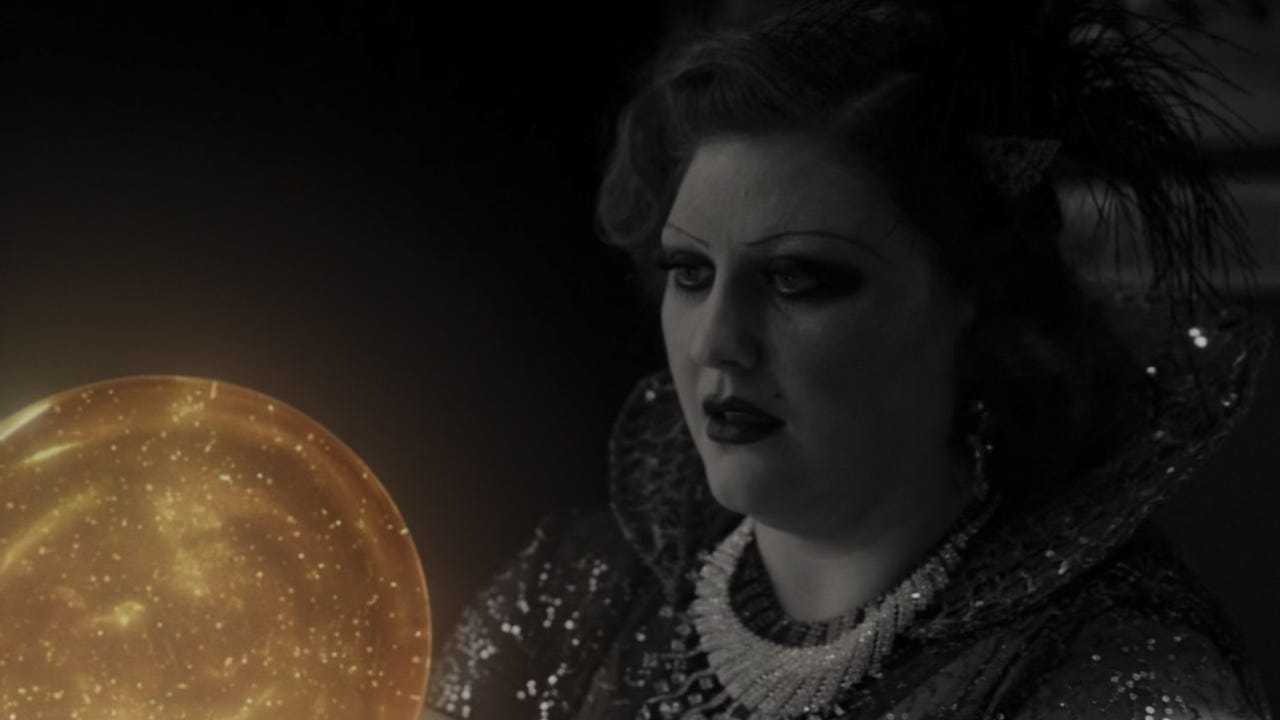John Avery Whittaker is in the White Lodge
How Evangelical radio show Adventures in Odyssey prepared me for my love of Twin Peaks and stories about making small acts of kindness matter.
In the early 1990s, young me discovered a show about a picturesque small town beset by larger, darker forces. Despite its friendly lunch counters and upstanding families, the town stood at the nexus of a struggle between cosmic forces.
Petty crimes by two-bit criminals fueled powerful international trade. The secret sins of an otherwise respected father draw the attention of an ineffable evil.
I am describing, of course, Odyssey, U.S.A., the setting of the long-running radio show Adventures in Odyssey, produced by the conservative Evangelical organization Focus on the Family. I am also describing Twin Peaks, Washington, the focus of the beloved odd-ball television series created by David Lynch and Mark Frost.
Well, I’m mostly describing both shows. Although Twin Peaks permeated so deeply into early 1990s culture that I knew about the show at a young age (thanks, Darkwing Duck), I didn’t watch it all the way through until the mid-2000s.
Yet, it occurs to me that my love of Twin Peaks was prepared, in part, by my childhood love of Adventures in Odyssey. Different as they seem at first, the two have enough in common that I can see why Lynch and Frost’s meditation on the omnipresence of good and evil resonates with me, and how even things produced by people with odious worldviews (read: James Dobson) still matter to me.
Welcome to Odyssey
Each episode of Adventures in Odyssey declares its intentions right away. After an opening vignette featuring narrator Chris (Chris Anthony, one of only two cast members who stayed on for every season of the series), we meet the show’s protagonist, John Avery Whittaker (“But you can call me ‘Whit,’ he says by way of invitation to the listener). Whit is just about to test his latest invention, which goes haywire as soon as it powers on.
Yet, no shortcoming deters Whit. “Okay, so it needs a little more work,” he concedes. “But that’s the exciting part because you never know what you’ll discover along the way!”
Between Chris’s cheerful invitation, Whit’s undaunted kindness, and the rousing theme by John Campbell, the intros reveal the show’s intended origin as an alternative to Saturday morning cartoons. Ever the culture warrior, Focus on the Family founder James Dobson saw the road to godlessness paved by Super-Friends and The Bugs Bunny/Roadrunner Show and he needed to stop it.
Dobson hired writers Steve Harris and Phil Lollar, who created Family Portrait, a ten-episode series about a small Midwestern town called Odyssey. After the success of that initial run, Family Portrait became Odyssey U.S.A. and then Adventures in Odyssey, running for more than 900 episodes from 1987 to today.
Thus, Adventures in Odyssey exists to teach moral lessons from an explicitly conservative Evangelical Christian perspective. Sometimes, these lessons have the innocuous feel of a 1950s hygiene short. Season one’s “Lights Out at Whit’s End” shows kids how to have fun without electricity. Other times, the show gets outright judgey, driving the otherwise avuncular Whit to lecture on the dangers of moral relativism or the allure of television.
Yet, even the most moralizing episode still works as compelling entertainment, thanks to Harris and Lollar’s commitment to character. They never let the citizens of Odyssey, the most enduring collection of yokels this side of The Andy Griffith Show (on which the first Whit performer Hal Smith played local drunk Otis).
However, Harris and Lollar knew that well-observed character work wouldn’t draw ‘80s kids' attention from the latest episode of Denver the Last Dinosaur, so they also worked over-the-top plots into the mix. Several episodes feature the Imagination Station, an invention that Whit keeps in his soda shop, Whit’s End. The Imagination Station functions like the holodeck in Star Trek: The Next Generation, allowing writers to tell whatever type of story they desire.
Most often, that meant sending kids from Odyssey back to Bible times, where they could witness tales from the New and Old Testaments. Despite Focus on the Family’s adherence to the literal truth of the New International Version of the Bible, Imagination Station stories did take some liberties for comic effect, as when they reimagined the prophet Samuel as a Borscht Belt comedian.
The Imagination Station also opened the way to surprisingly dark stories. In one, a teen collapses in guilt after witnessing the crucifixion. In another, fan-favorite Eugene, then a non-believer, visits the afterlife and realizes that he’s in Hell. Outside of the theologically loaded adventures, the Imagination Station and its super secret program “Applesauce” were extensions of government programs that Whit did for the CIA, essentially transforming Odyssey into the heart of America’s intelligence operation.
The Imagination Station episodes transform Odyssey from a wholesome hamlet into the center of a vast battle between good and evil, on both the political and legal planes. Just like Twin Peaks.
Coffee Black as Midnight on a Moonless Night
It doesn’t take much to imagine FBI Special Agent Dale Cooper driving into Odyssey, saddling up to the counter at Whit’s End and enjoying an, excuse me, damn fine milkshake. Why, he’d even apologize when Whit reprimands him for cursing in public.
Cooper fits so well because both the Focus on the Family team and David Lynch draw from the same inspiration: American culture of the Eisenhower era. Both Dobson and Lynch remain stubbornly naive about America in the 1950s, Dobson for political reasons and Lynch for the exact opposite. They both see something wonderful in villages where everyone gets involved in each other’s business, they valorize the Sheriff and the small business owner, and they imagine g-men as lantern-jawed agents of uncomplicated good.
Moreover, both insist that small-town interactions can have cosmic import. At the risk of putting into rigid lore something best understood as fluid dream logic, Twin Peaks imagines the titular town as the locus of a struggle between figures of good and evil. Or, if that’s too literal, light and darkness.
The darkness arrives in the form of Bob (Frank Silva), the long-haired and demon-clad figure behind the rape and murder of Laura Palmer (Sheryl Lee). The Arm (Michael J. Anderson), the Giant (Carel Struycken), and Mike (Al Strobel) all oppose Bob to various degrees, even if they remain tied to him. They and other cosmic figures hold meetings above a convenience store where things happen too vast for the human mind to comprehend.
These forces feed upon “garmonbozia,” pain and suffering that takes the form of creamed corn, which then gets slurped up.
In light of this conflict, Twin Peaks’s kitsch operates as a refusal to give into the darkness, a refusal to create more pain and suffering, silly as it sounds. Despite its often upsetting subject matter, Twin Peaks became a sensation when its first season aired on ABC in 1990, largely because people wanted to reject the naive 1950s that conservative organizations such as Focus on the Family tried to enforce. For them, Cooper was corny and his love of coffee and pie and flashing a thumbs up was ironic, as was the show’s use of soap opera tropes.
Now we now understand that the show has zero irony. As further demonstrated in the 1992 prequel movie Twin Peaks: Fire Walk With Me (directed by Lynch and co-written with Robert Engels), the Mark Frost-penned books The Secret History of Twin Peaks and Twin Peaks: The Final Dossier, and especially the 16-episode revival series Twin Peaks: The Return from 2017, it’s clear that the show treats all the corny stuff, from Coop’s enthusiasm to the romance between Big Ed Hurley and Norma Jennings to Garland Briggs’s love for his troubled son Bobby, with unblinking sincerity.
Because in Twin Peaks, love pushes back the darkness. And Adventures in Odyssey agrees.
Small Town Matters
Part 8 of the 2017 revival series Twin Peaks: The Return plays like a collection of unlikely events, including a performance by rock band Nine Inch Nails in the roadhouse outside of town and a life-and-death encounter for Cooper’s evil doppelgänger Mr. C.
An extended wordless sequence at the center of the episode portrays the detonation of the first atomic bomb, in 1945 Nevada. What begins as a sober depiction of the explosion turns surreal, as the camera pushes into the mushroom clouds to reveal otherworldly figures therein. Set to the strains of composer Krzysztof Penderecki’s Threnody to the Victims of Hiroshima, we see a featureless grey creature emerge from the disruption and into the world.
Watching the creature’s arrival are two benevolent beings within the White Lodge, the Giant and Señorita Dido (Joy Nash). In response, Dido calls forth a glowing orb. Wracked with sorrow, Dido turns the orb to reveal the face of Laura Palmer before sending it into the world, as if sending Laura to incarnate in Twin Peaks.
Like the best parts of Lynch’s work, the explosion sequence defies simple explanation. Many have read it as the staging of a metaphysical battle between the creature (dubbed “the Mother” or “Judy,” an evil even greater than Bob) and Laura, an angelic figure whose death brings Cooper to town and puts an end to the threat.
That’s too simple an interpretation, one that stretches thin as it tries to cover the series as a whole. That’s the type of interpretation one could bring to Adventures in Odyssey which, for all it does well, remains a kid’s show filled with moral lessons.
However, the difference between the infinite complexity of Twin Peaks and the linear morals of Adventures in Odyssey doesn’t take away from the fact that both suggest mundane acts of kindness and cruelty reverberate far beyond the nondescript town where they occur. Both present people as at once goofy bumpkins and reservoirs of complex emotion, worthy of respect.
As a kid, I didn’t listen to Adventures in Odyssey for such depths. I listened to enjoy the likable characters, the entertaining adventures, and (yes, really) the clear Christian morals. My tastes have matured as I’ve aged, as have my religious beliefs. Yet I still appreciate Adventures in Odyssey for helping me think about the profound within the pedestrian, an appreciation only further developed by Twin Peaks.
Words Joe Wrote (or said) This Week
The Penguin: Cristin Milioti on Sofia Falcone’s Rise and Whether She Could Take on the Batman - Den of Geek (w/ Sam Stone)
American Psycho: The Actors Who Could Be the Next Patrick Bateman - Den of Geek
Dune: Prophecy Will Challenge Assumptions About the Harkonnens and Atreides - Den of Geek (w/ David Crow)
Blade Release Date Cancelation Is a Good Thing for Marvel - Den of Geek
Dune: Prophecy Just Teased the Most Powerful Weapon in the Frank Herbert Universe - Den of Geek
Star Trek Just Brought Back the Weirdest Version of Its Oldest Aliens - Den of Geek
Venom 3: All the Symbiotes and Cameos Explained - Den of Geek
Venom 3’s Sinister Six Tease Is Too Little, Too Late - Den of Geek
The Penguin Episode 6 Review: Taking Back Gotham - Den of Geek
Star Trek Just Poked Fun at One of Deep Space Nine’s Most Important Episodes - Den of Geek
Review: The Deciders and the Challenges of Class Consciousness - The Progressive
Death Spa - The Good Bad Movie Show (w/ Kirsten Howard)







